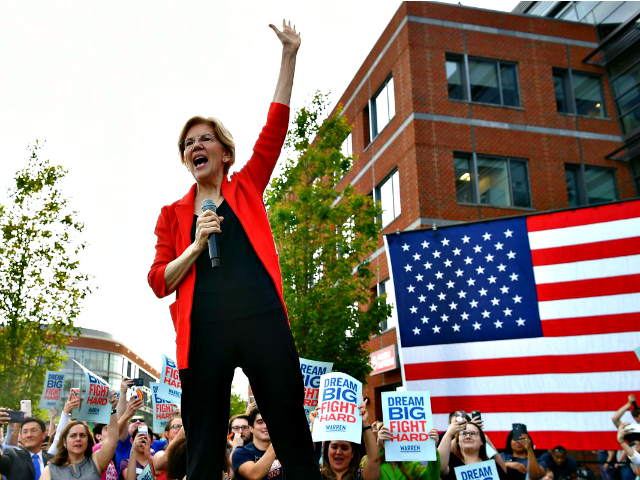Sen. Elizabeth Warren’s (D-MA) 2020 presidential campaign continues to gain momentum as a new poll out of Nevada shows her firmly in second place behind former Vice President Joe Biden, the Democrat frontrunner.
Monmouth University released a new poll on Wednesday indicating Warren ranks second with 19 percent among Nevada voters. The poll, which is Monmouth’s first ahead of the Silver State’s caucus in February 2020, found Biden leading overall with 36 percent, followed by Warren, and then Sen. Bernie Sanders (I-VT) in third place with 13 percent.
Monmouth conducted the poll by surveying 1,333 Nevada voters from June 6 through June 11. It drew from a pool of both Democratic and unaffiliated voters who participated in a primary or general election in the past two cycles or have registered to vote since November 2018. The poll has a margin of error of +/- 5.1 percentage points.
Apart from showing Warren in second place, the results also indicate the Massachusetts senator has considerable support among different factions within the state’s Democrat base.
Voters “who consider themselves moderate or conservative” prefer Biden by double-digits (47 percent). Warren ranks second (11 percent) above Sanders (9 percent). Although, Biden does well with such voters, his lead shrinks overwhelmingly as you move left across the political spectrum.
Among voters that identify as “somewhat liberal,” Biden only holds a single-digit lead over Warren (31 percent to 24 percent). Meanwhile, Sanders drops to fourth place (8 percent) behind South Bend Mayor Pete Buttigieg (12 percent) among the same cohort. When it comes to “very liberal” voters, Warren (27 percent) leads Sanders (26 percent), albeit in the margin of error, with Biden in third place (19 percent). Very liberal voters are an integral part of the Democrat electorate—accounting for nearly 25 percent of likely caucus-goers.
As Nevada’s population has continued to grow, Monmouth measured the level support each candidate received among those for whom 2002 will be their first caucus. Biden at 48 percent led Sanders at 16 percent with these new voters, with Warren and Buttigieg tied at 4 percent each.
For prior caucus-goers, the trend looked similar to the overall poll. Biden was in first place with 33 percent followed by Warren at 23 percent. Sanders, who came within single digits of winning the Nevada Caucuses in 2016, only hit 12 percent among those that attended a prior caucus.
Latino voters still prefer Sanders to Warren, although within the margin of error. Among the demographic, Sanders is at 19 percent, while Warren is only at 11 percent. Overall, Biden still leads among Latinos with 27 percent, but a sizable chunk (20 percent) stated they “did not have a candidate preference at this time.” Monmouth noted, however, that the subsample of Latino respondents had a margin of error of +/- 7 to 10 percentage points for Biden, Warren, and Sanders.
“Nevada is the first state on the Democrats’ 2020 calendar with an ethnically diverse electorate. Latino voters seem to be particularly up for grabs right now,” Patrick Murray, director of the Monmouth University Polling Institute, said in a statement accompanying the results.
The poll also found that Warren’s favorable and unfavorable ratings are on par with those of Biden. Seventy-eight percent of potential caucus-goers reported a favorable view of Biden, while only 13 percent reported unfavorable. Similarly, 70 percent of respondents said they had a favorable view of Warren compared to 11 percent unfavorable. Sanders was viewed favorably only by 65 percent of respondents but had the highest unfavorably rating (20 percent) of any candidate save New York City Mayor Bill de Blasio (33 percent).
“Nevada’s highly unionized service sector workforce may be a good fit for Warren’s policy platform when you look at the Democratic electorates in the four early states,” Murray said. Adding that Warren’s numbers among minority voters—who count heavily in the state’s electorate—weren’t as strong as those exhibited by other candidates.
The Monmouth poll comes the same day as poll by The Economist and YouGov showing Warren vaulting over Sanders into second place nationally.

COMMENTS
Please let us know if you're having issues with commenting.